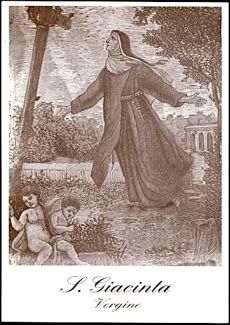At age 17, Hyacintha suffered an unknown accident, and her life was miraculously saved. Not even this changed her heart. At age 20, Hyacintha was passed over by the man she had hopes to marry—he chose her younger sister, which filled her with rage. Furious, she became unable to be tolerated by her parents, who, according to tradition at that time, declared she should enter the convent. Hyacintha half-heartedly took the veil at the Franciscan convent of Viterbo. The Franciscan sisters followed the rules of poverty, chastity, and obedience. While Hyacintha attended devotions, and maintained her vow of chastity, she ignored the rules of poverty and obedience, declaring her intention to use her personal funds to finance a life of comfort. For over 10 years she lived within the convent, maintaining her own kitchen, wearing a habit of the finest material, entertaining visitors, and keeping her room both comfortable and worldly.
It was not until her confessor visited her in her cell to deliver the Holy Eucharist while Hyacintha was ill that her ways changed. Surprised, appalled, and somewhat dismayed, he pointed out the inappropriateness of her life. He stated that her presence in the convent was merely to help the Devil. His remarks changed her heart. She later declared publicly before her sisters and the Franciscan community the errors of her ways, confessing, and becoming a model Franciscan, and mentor to the novices.
Moved by her realization, and changed by the grace of God, Hyacintha discarded her costly habit for an old, used one. She gave up her worldly pleasures, oftentimes going barefoot, replacing her bed with rough boards, rigorously practicing self-denial, and frequently fasting on bread and water for days at a time. Hyacintha requested and performed the most menial jobs in the convent. Her personal devotion to the Jesus, to the Passion of Christ, to the Holy Eucharist, and to the Blessed Mother deepened through contemplative prayer. She embraced mortification, scourging herself with a spiked belt (pictured below), and connecting her bodily pain to the Passion of Christ.
 Hyacintha became a model of charity towards others, begging door to door to collect food and clothing for the poorest of her community. She ministered to those others had forgotten: those infected with plague, the homeless, the imprisoned, the ill, and the proud. Hyacintha founded two community groups (one of which, the Oblates of Mary, was dedicated to the Blessed Mother) to serve the poor, ill, and aged. Despite her courage, Hyacintha refused praise or commendation of any kind, considering herself completely unworthy. She said, “The sort of people who most appeal to me are those who are despised, who are devoid of self love and who have little sensible (spiritual) consolation.... The cross, to suffer, to persevere bravely in spite of the lack of all sweetness and relish in prayer: This is the true sign of the spirit of God.”
Hyacintha became a model of charity towards others, begging door to door to collect food and clothing for the poorest of her community. She ministered to those others had forgotten: those infected with plague, the homeless, the imprisoned, the ill, and the proud. Hyacintha founded two community groups (one of which, the Oblates of Mary, was dedicated to the Blessed Mother) to serve the poor, ill, and aged. Despite her courage, Hyacintha refused praise or commendation of any kind, considering herself completely unworthy. She said, “The sort of people who most appeal to me are those who are despised, who are devoid of self love and who have little sensible (spiritual) consolation.... The cross, to suffer, to persevere bravely in spite of the lack of all sweetness and relish in prayer: This is the true sign of the spirit of God.” Saint Hyacintha’s life is unlike many of the holy men and women we hear about. She was blind to the call of the Lord for the first 35 years of her life, choosing instead worldly indulgences. Her repentance and rebirth in Christ, through contemplation, service to those in need, and mortification of her body is all the more remarkable, given her early life. This woman, of quick temper and spiritual apathy, became a model of Christ to her Franciscan sisters and to her community, herself a reflection of His love for all—even those that had been forgotten by society. This inspires us to look at our own lives, regardless of age—what are the habits and addictions we put before the Lord? What worldly pleasures are more important to us than the deepening of our faith in Christ? What will it take for us to hear the call, see the error of our ways, and be reborn?
Day 30 of 365
Prayer Intentions: Courage and conviction to be reborn to the Lord, regardless of age!
Requested Intentions: Reconciliation of struggling marriages (A); Reconciliation and healing in personal relationships (N); Safety for friend deployed to Afghanistan (S); Those considering or having attempted suicide (Pr. L); Those who serve the Archdiocese of Los Angeles (N); Safety of friend/ relief worker in Haiti (L); Health and safety of new daughter (J); Renewal of loving Christ-centered relationship (A).











0 comments:
Post a Comment
Thanks for leaving a comment. If you wish to submit a prayer request, however, please do so above, using the "Contact" tab.